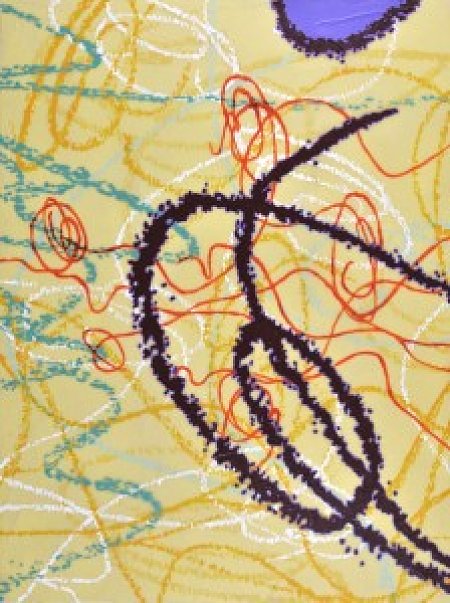
Numbers
It has been a couple of days since I talked to anybody; I don’t eat and I don’t feel hungry, even though other people on the train are stealing things from each other and fight for each crumb… What really bothers me is that I don’t write anymore.
Yet I’m almost happy now that life provides me with no conveniences for writing, with no light in these cars, but instead gives me excuses… Whom am I trying to fool? Writing is survival for me. Despite what this woman said, I’m protected by my talent… So much talent cannot be wasted, and to earn my right to live, I have to utilize my creative abilities, so in the next few days I have to come up with a story; otherwise, I will die.
VII.
Loneliness on the train… crowds of strangers… surrounded by them, I feel even lonelier, because somebody chose all these people thinking of them as one kind. But I’m of a totally different kind. I’m not interested in trite things and conventional wisdom; neither did I take with me family gold, like some people did. One of the men here is hiding a miniature Torah in a large loaf of bread, but none of them would care about Fratelli Scarfati or fame.
Days are turning into torture. And this torture is not because there is almost nothing to eat: a good-looking girl always can find food for herself using her charm… But I’m tortured because I don’t know what to make of what is going on.
For example, my father: he was spared by the ship and killed by the bicycle. Is there any logic in this? He missed his ship in the Great War because of alcohol and moscardini and he survived… He didn’t know how to ride a bike to escape from a concentration camp and so he stayed there…
This is how I found out about it: a man approached me and told me that he was one of my neighbors. I hardly knew him but agreed that this could be the case, since I don’t pay attention to things not pertaining to literature. The “neighbor” told me that my father was led to the jail in Milan, a big jail where it was cold and icy and people slept on the beds of ice and got sick and died there, that my father survived the prison ordeal but ended up in an Italian concentration camp where rules were rather lax; actually, they were so lax that one of the inmates suggested a plan of escape…
This inmate, a former patient whom my father once treated for gall stones, gave my father a hand-drawn map and arranged for a bicycle, so that all my father had to do was sneak to the fence, climb onto the bicycle seat, and pedal toward a village where a Catholic priest already expected him…
But one has to know my Papá… my Papá never rode a bike in his life; he only read books… So he rejected the offer, explaining that he was not able to ride a bike… His former patient could not believe this and thought that my father simply didn’t want to risk other lives, because if the fascists discovered that one person escaped, they would kill ten… It’s all numbers for them… This inmate told me that my father stayed and apparently died, because one day he just went “to work” and never came back. This inmate had no idea what happened.
I could not bear to hear this, but after my sadness my brain switched on… Here is the story of a man saved by missing a boat, and here he is failed by his inability to ride a bike… The ship saves him but the bicycle is a traitor… Is there logic in this?
Is there any logic in the story of Giuseppe, the story which another neighbor told me?
One morning Giuseppe felt like smoking and realized that there were no cigarettes at home, so, with an old smoker’s urgency, he went down to get them. When he came back only half an hour later, he saw that all his nine children and wife were gone, taken away by the SS. Giuseppe survived, but his wife and nine children were taken in an unknown direction… No logic again!
The story I write should be straightforward… It should be about numbers, perhaps… I was touched by Olga’s story about her childhood and the page number she had to keep in her memory to report to her mother, and I thought that to base a short story on that would be nice… Not numbers referring to the extermination of ten people for the escape of one person, but numbers referring to pages of literature… As soon as I find something logical and conclusive, I will start and complete my masterpiece.
The only problem is that during these days on the train I wrote almost zero numbers of words, real “art” words, not just scribbles in a diary; unfortunately, things that I find just don’t seem worth mentioning. Stories of bodyselling on the train, going on right in front of my eyes… Glimpses into physical pleasure when you start eating… Constant quarrels over the lack of conveniences…. Overall, I just don’t feel like writing, it’s like some kind of writers’ block prohibits such descriptions… Or maybe I see some truth here, some deep meaning of whatever is happening to all of us, to all Italian Jews, and I just don’t want to confess it. And because of it, because I don’t want to utter this truth, because of it I don’t write? This is what I heard happens to writers who cease writing once and forever: they suddenly discover the truth but are so afraid of uttering it–uttering it would be like accepting its existence–that they stop writing.
